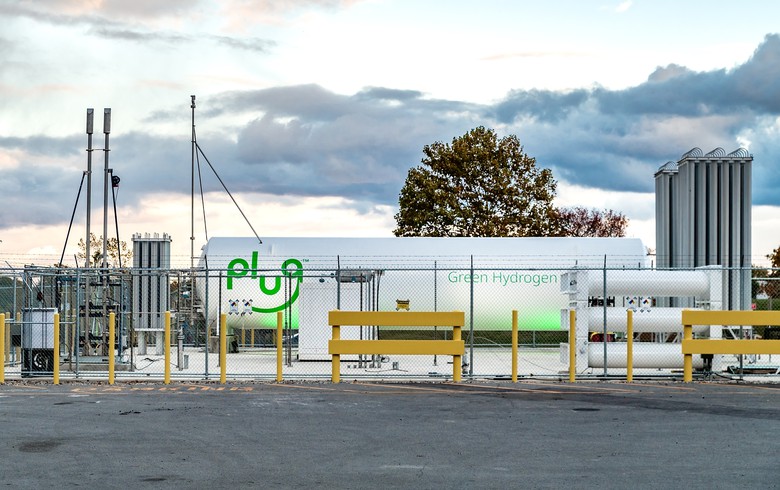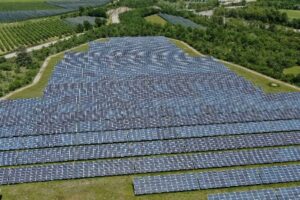Plug’s fundamentals are good, CEO Andy Marsh says

Plug Power Inc (NASDAQ:PLUG) had a rough week on the stock market after the company filed a going concern warning on November 9. Chief executive Andy Marsh, however, is not too worried about the share price, or the situation as a whole, and is confident that he could easily raise the money needed to fund activities going forward.
In an interview with Renewables Now, Marsh painted a clearer picture of the current financial situation at Plug, stressing the fact that the company has significant amounts of cash resources and no debt.
Do you know we have a daily hydrogen newsletter? Subscribe here for free!
“[…] sometimes the headlines are much worse than the reality. If you believe the headlines, it’s horrific,” he said, adding that the situation is different when “you live it every day and you know what you’re doing.”
The US hydrogen technology company is focused on establishing its own green hydrogen production network in addition to selling fuel cell systems, material handling equipment, fuelling stations and electrolysers. This requires a lot of investment and, for now, keeps the company away from profitability. Not only did it just recently post a new and larger quarterly net loss, but also shared it expects to book operating losses for the foreseeable future as it continues to pursue its expansion plans.
The fall in Plug’s stock price began after the company released its Form 10-Q, which includes the following notice: “In light of the Company’s projected capital expenditure and operating requirements under its current business plan, the Company is projecting that its existing cash and available for sale and equity securities will not be sufficient to fund its operations through the next twelve months from the date of issuance of this Quarterly Report on Form 10-Q. These conditions and events raise substantial doubt about the Company’s ability to continue as a going concern.”
Marsh, though, brushed the worries aside, saying that the backwash was an overreaction.
“There’s a clear plan. It’s not really that big of a deal. You know, when I look at it, the company has USD 585 million in cash, USD 1 billion in restricted cash, USD 1 billion in inventory and I’ve been telling the world for months that I was going to raise USD 500 million to USD 600 million. And it really was just an accounting announcement that the company made. So, it’s not that big of a challenge for us,” he stated. “I’ve got a USD 5 billion balance sheet that has no debt. Raising USD 500 million doesn’t feel like a lot to get through the next year.”
On the topic of Plug’s share price, Marsh said he expects it to recover. “I think you’re going to see the stock price move significantly on a short squeeze. Am I concerned about it? I’d be concerned about the stock price even if it was ten times higher, but the fundamentals of the company are good,” he said.
Still, the CEO is happy that Plug is trading on the stock market because this makes it easier to raise large amounts of money. “I could raise that kind of money in five or six days,” he said and even mentioned that the company has term sheets for USD 1.5 billion but not at terms he is satisfied with. Right now, Plug’s prime focus is to leverage its strong balance sheet to raise between USD 500 million and USD 750 million.
Plug’s latest quarterly loss was attributed to “unprecedented supply challenges” for the hydrogen network in North America over the past several months. As Marsh mentioned on the conference call while reporting third-quarter results, the network is now stable. To further improve the situation, the company expects its hydrogen production plants in Georgia and Tennessee to start producing at full capacity by the end of 2023.
The chief executive also spoke about the challenges associated with hydrogen project development in both the US and Europe. Other than slow permitting, the biggest difficulties he pointed at are the price volatility in the market and the fact that “nobody knows for certain” what qualifies as green hydrogen.
“Here in the US, we’re waiting for the regulations for the Production Tax Credit (PTC) to be written. And look, even I know it’s hard to write that, but those issues of regionality, time-matching, and additionality, issues that Europe has struggled with also, is a struggle here in the US, too. I think that uncertainty of what’s going to qualify has been an issue,” he explained.
Marsh also nodded toward the German federal government’s involvement in Siemens Energy’s efforts to secure guarantee lines.
“I just think that the government has to help across the board, maybe with project guarantees. I saw that Germany’s government stood behind Siemens yesterday [Nov 14] to kind of provide guarantees for some of their work. I think that’s really beneficial. I don’t think the government has to put its own money in place. I think it needs to help take the risk. And I think that will help accelerate projects,” Marsh noted.




